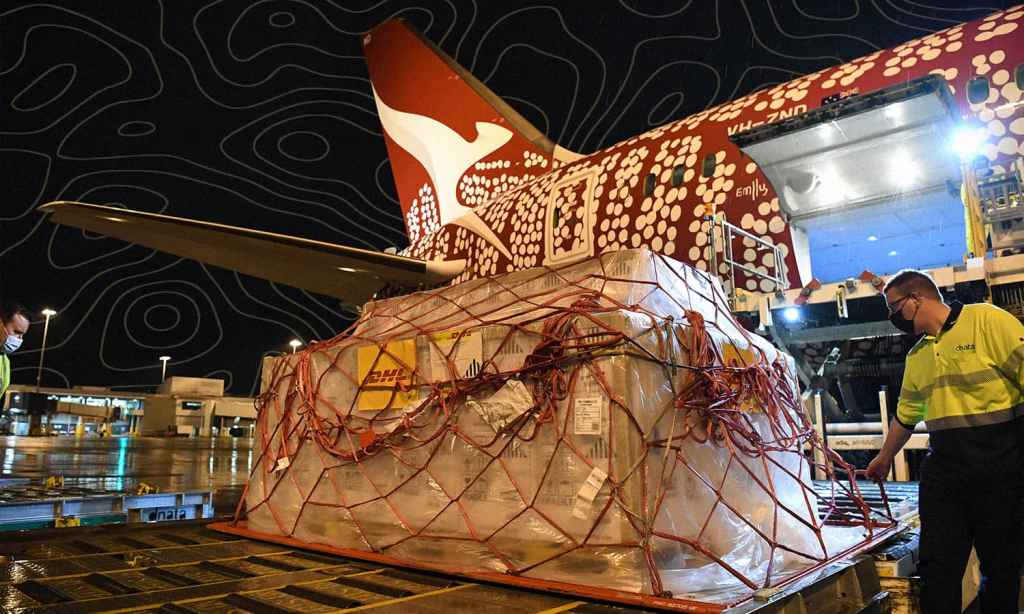Australia has been vaccinating its way to freedom at an phenomenal rate over the past few months, climbing from dead last in the 38 OECD countries to 27th place.
While it’s still not great, and largely down to the shambolic start we had, with delayed vaccine orders and confusing public health messaging, it is enough to finally get us some of that sweet, sweet freedom that the rest of the world has been enjoying for some time.
We’ve also now got some of the most vaccinated places on the planet, with 98% of Canberrans having received their first dose of the vaccine. NSW is well above 80% double dose and restrictions are rapidly easing while VIC has also just hit their 70% double dose target and will see restrictions ease from tomorrow.
It’s cause for celebration for sure, but with only 1% of people in low income countries having received two doses of any vaccine, it appears that Australia is not doing its fair share to support the rest of the world.
According to Oxfam, only 14% of the doses promised to developing nations have actually been delivered to date. Australia has only delivered 3.4 million — or 6% — of the 60 million doses it promised as part of the COVAX scheme to help vaccinate the world. At the same time, we have also ordered 500 million doses of the Pfizer vaccine while other countries struggle to meet demand.
Australia is one of the countries currently manufacturing AstraZeneca vaccines, a jab that the federal government has been phasing out over the past few months and will seek to stop using except upon request by November.
CSL, the pharmaceutical company making the vaccine in Melbourne, nearly had its contract terminated with the Australian government, but has since confirmed that it will fulfil the 50 million dose order made by the Morrison government.
Health Minister Greg Hunt has said that spare AzstraZeneca vaccines will be given to neighbouring countries like Fiji, Indonesia, Vietnam, and Papua New Guinea however Oxfam has criticised the government for not doing more to share those vaccines with developing nations sooner.
Australia has a stockpile of seven million AstraZeneca jabs that doctors and pharmacists are urging the government to put to use to prevent them going to waste. Part of the problem lies in the fact that many wealthy nations have declined to force pharmaceutical companies to wave their patent rights over the vaccines in order to profit from the sale of them.
Over 100 of the world’s poorest nations have voiced their support for such a measure, but the EU and other rich nations have declined to do so. Australia has only just decided to back this idea and yet has failed to act upon it.
Oxfam Australia Chief Executive Lyn Morgain has said that “The failure of rich country donations and the failure of COVAX have the same root cause”
“We have given over control of vaccine supply to a small number of pharmaceutical companies, who are prioritising their own profits.
“These companies aren’t producing enough to vaccinate the world, they are artificially constraining the supply, and they will always put their rich customers at the front of the line.
“The only way to end the pandemic is to share the technology and know-how with other qualified manufacturers so that everyone, everywhere can have access to these lifesaving vaccines.”
During the UN General Assembly in September, US President Joe Biden rallied support for the goal to vaccinate 70% of the world by September 2022. While it’s an ambitious target, and rightly so, there is still no plan to achieve it.
Winnie Byanyima, Executive Director of UNAIDS, said “Rich nations and corporations are shamefully failing to deliver on their promises whilst blocking the actual solution; ensuring developing nations have the ability to make their own vaccines.
“It is painfully clear that the developing world cannot rely on the largesse and charity of rich nations and pharmaceutical companies, and hundreds of thousands of people are dying from COVID-19 as a result. This is beyond appalling.”
The WHO has stated that it should be a global priority to get doses to developing countries by the end of this year, but the People’s Vaccine Alliance — a group of 77 NGO bodies like Oxfam, Global Justice Now, and UNAIDS — have said that rich countries are not listening and that inadequate vaccine supplies are likely going to lead to countless unnecessary deaths.
Maaza Seyoum of the African Alliance and People’s Vaccine Alliance Africa said “Across the world health workers are dying and children are losing parents and grandparents. With 99% of people in low-income countries still not vaccinated, we have had enough of these ‘too little too late’ gestures.
“Governments must stop allowing pharmaceutical companies to play god while raking in astronomical profits and start delivering actual action that will save lives.”
In order to fix the issue, the People’s Vaccine Alliance recommends that all countries suspend intellectual rights over COVID vaccines, tests, and treatments, force pharmaceutical companies to share COVID data and technology with the WHO, establish manufacturing hubs developing nations, and redistribute existing vaccine stockpiles.
While we celebrate, others are still struggling. Now it’s up to us to help them out.
Read more stories from The Latch and subscribe to our email newsletter.







